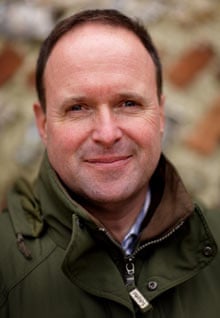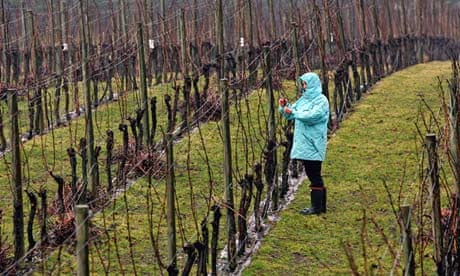England's burgeoning sparkling wine vineyards could come to the rescue of struggling rural economies by creating hundreds of new jobs, wine-makers have predicted.
Swaths of chalky soil in the south-east of England are being planted with chardonnay, pinot noir and pinot meunier grapes to make champagne-style wines, which require many times more workers than the dairy or arable farms they are replacing.
Rathfinny on the Sussex Downs, which is set to become the country's largest single vineyard when it is fully planted, predicts it will need the equivalent of 70 full-time workers instead of the two required to farm the same land before the vines arrived.
Earlier this year the Conservative peer Lord Ashcroft planted 44 acres of vines in Hampshire, close to an existing vineyard Ashcroft bought with the Belize-based company Shellproof. The company is also understood to be considering buying more vines in Kent.
"This is a tremendous job creation opportunity," said Mark Driver, a former hedge fund manager who bought the 400-acre Rathfinny plot in East Sussex. Driver says the vineyard could produce 1m bottles a year by 2020.

"If you want a job then learn a little bit about viticulture. At the moment we can't find the kind of people that we need. A real problem in the south-east is deprivation, beyond the areas that are commutable to London.
"There is a lot of unemployment and this is hopefully going to provide a lot of jobs to the rural economy."
The area of land planted with vines in the UK has risen by 60% in the last decade as the reputation of English sparkling wine has strengthened, with major brands such as Nyetimber and Chapel Down securing international awards.
This summer's heatwave has boosted hopes for the one of the best vintages in years in the wine lands of Hampshire, Surrey, Sussex and Kent.
Peter Morgan, a wine-maker at Plumpton college, which provides training in viticulture and wine-making, said there has been "a sudden surge in people investing in quite considerable plantings" and predicted English vinelands could increase by 50% in the next five years, creating around 500 further jobs.
"Rural poverty and unemployment exists, but people don't see it," said Chris Foss, head of the college. "There are new jobs in wine, not just in growing vines and making wine, but also in local hospitality. If you think of what wine has done for areas like Champagne, you realise there are no jobs in large scale agriculture but places that are producing wine are thriving.
"Wine is special because of the culture that goes with it. You don't rush out to visit a pig farm, but people go especially to Alsace for good wine, food and to stay in a hotel. There will be more of that activity in the south-east of England."
Farmland with grape-growing potential sells quickly as more and more investors seek to profit from the growing appetite for English fizz. A hectare of land producing eight tonnes of grapes can produce 7,000 bottles of sparkling wine. If they sell for around £20 each, that means annual revenues of £140,000 per hectare.
Stephen Skelton, who planted the well-established Chapel Down vineyard in Kent and advised Ashcroft's company on its recent acquisitions, said in order to produce the best vineyard owners need teams of people who become familiar with their particular vines.
"There is undeniably an opportunity and vineyards are bringing employment to areas where employment has waned in raising apples and pears and soft-fruits," he said.
"There is more money about and there are a lot of people who have made a lot of money in the City and we are seeing people coming in who have some years of their working life left and just want a complete change of lifestyle."
